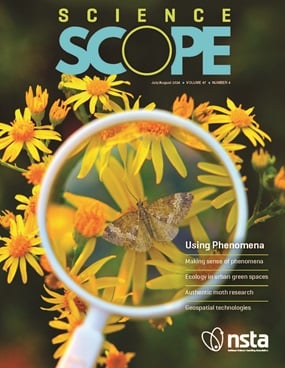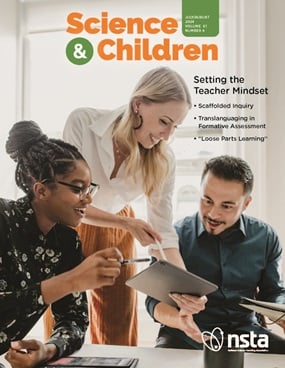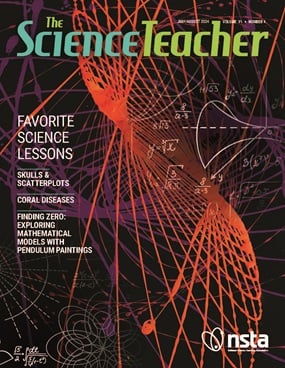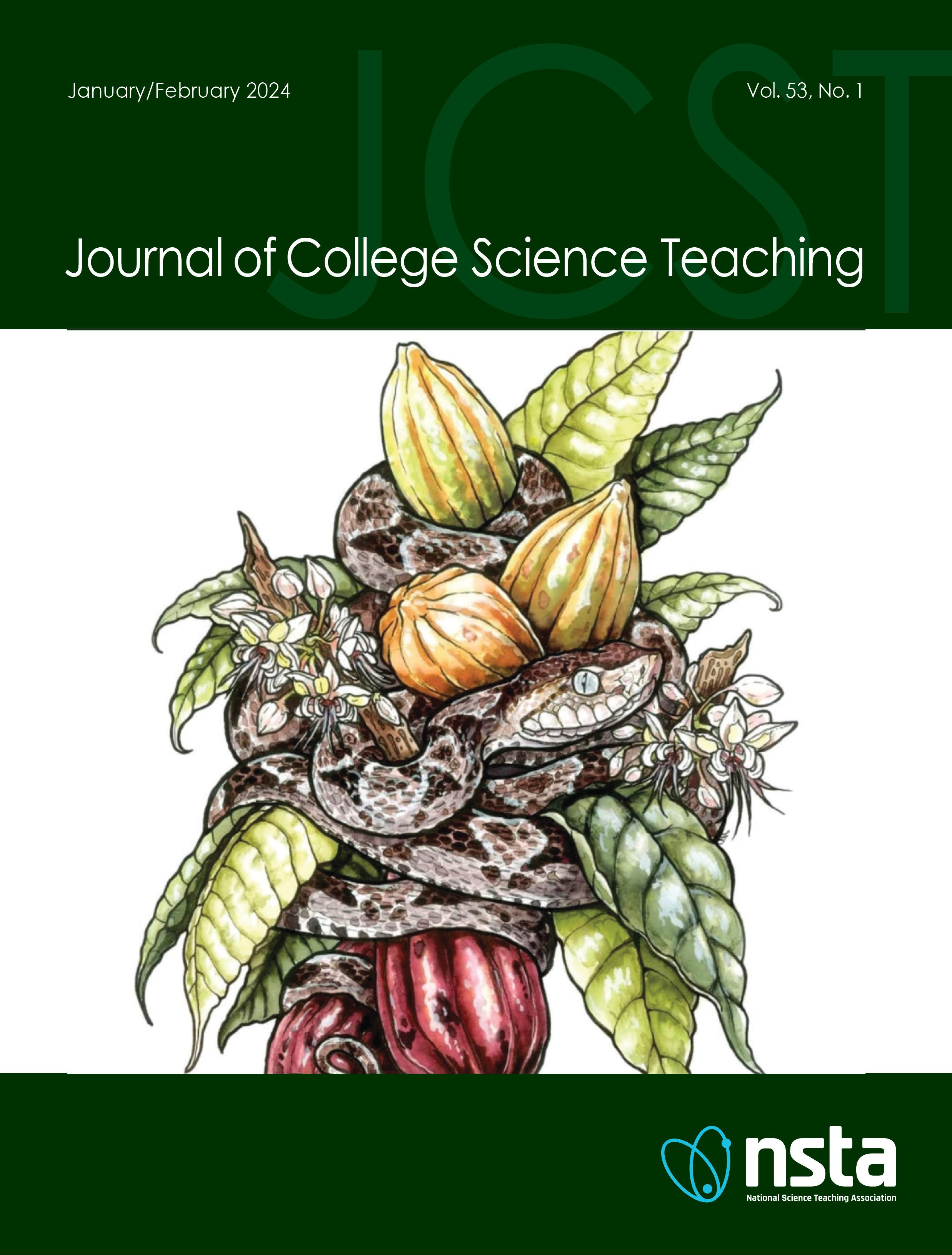All Resources
Journal Article
Local landscapes examined via Google Earth provide a natural arena on which students can analyze how humans modify and interact with their environment. These lessons guide students through an exploration of the natural and built environments both nea...
By Carol Colaninno, Adriana Martinez, Charlie Blake, Candice Johnson
Journal Article
Globalizing STEM Instruction Using Sustainable Development Goals
Global education presents an opportunity for all classroom teachers, regardless of subject or grade level, to engage students in understanding globally relevant issues that extend from content taught in class and providing opportunities for students ...
By George Hademenos
Journal Article
In this unit, students explore the phylogeography of three-toed sloths (Bradypus pygmaeus and Bradypus variegatus) endemic to the Bocas del Toro islands off the Caribbean coast of Panama. After learning about the geologic history of this region, stu...
By Tyler St. Clair, Kristen Conklin-Kearney
Journal Article
Helping Students Use Crosscutting Concepts to Guide Sensemaking of Anchoring Phenomena
Crosscutting concepts (CCCs) are designed to help students make sense of phenomena across multiple scientific disciplines (National Research Council 2012). Since they are applicable to explaining so many different phenomena, they have the potential t...
By Nicole Vick, Michael Novak, Dan Voss, Brian Reiser, Joseph Kremer, Whitney Mills, Jamie Noll, Dawn Novak, Ann Rivet
Journal
Lesson Plan
Web Seminar
The Shell Science Lab Regional Challenge Competition recognizes exceptional and innovative science educators for their exemplary approaches to science lab instruction utilizing limited school and laboratory resources. The competition also raises awar...
Web Seminar
Shell Science Teaching Award: This award recognizes one outstanding classroom science teacher (K–12) who has had a positive impact on his or her students, school, and community through exemplary classroom science teaching. K–12 ...
Web Seminar
Curious about integrating sustainability and renewable energy concepts into your high school science curriculum? Join Vernier Science Education experts Fran Poodry, Dr. Melissa Hill, and Colleen McDaniel as they showcase engaging investigations that ...
Class Pack
Now Available for Grade K-2 Picture Perfect STEM Lessons - Ready-to-TeachTM Picture-Perfect ClassPacks! • We are excited to announce our new kitting partner: ECA Science Kit Services! Now offering ...
Class Pack
Flight of the Pollinators ClassPack
Now Available for Grade K-2 Picture Perfect STEM Lessons - Ready-to-TeachTM Picture-Perfect ClassPacks! • We are excited to announce our new kitting partner: ECA Science Kit Services! Now offering ...
Class Pack
Now Available for Grade K-2 Picture Perfect STEM Lessons - Ready-to-TeachTM Picture-Perfect ClassPacks! • We are excited to announce our new kitting partner: ECA Science Kit Services! Now offering ...
Class Pack
Now Available for Grade K-2 Picture Perfect STEM Lessons - Ready-to-TeachTM Picture-Perfect ClassPacks! • We are excited to announce our new kitting partner: ECA Science Kit Services! Now offering ...
Class Pack
Now Available for Grade K-2 Picture Perfect STEM Lessons - Ready-to-TeachTM Picture-Perfect ClassPacks! • We are excited to announce our new kitting partner: ECA Science Kit Services! Now offering ...
Class Pack
Now Available for Grade K-2 Picture Perfect STEM Lessons - Ready-to-TeachTM Picture-Perfect ClassPacks! • We are excited to announce our new kitting partner: ECA Science Kit Services! Now offering ...
Class Pack
Now Available for Grade K-2 Picture Perfect STEM Lessons - Ready-to-TeachTM Picture-Perfect ClassPacks! • We are excited to announce our new kitting partner: ECA Science Kit Services! Now offering ...
Class Pack
Melting and Freezing ClassPack
Now Available for Grade K-2 Picture Perfect STEM Lessons - Ready-to-TeachTM Picture-Perfect ClassPacks! • We are excited to announce our new kitting partner: ECA Science Kit Services! Now offering ...
Class Pack
Imaginative Inventions ClassPack
Now Available for Grade K-2 Picture Perfect STEM Lessons - Ready-to-TeachTM Picture-Perfect ClassPacks! • We are excited to announce our new kitting partner: ECA Science Kit Services! Now offering ...
Class Pack
Now Available for Grade K-2 Picture Perfect STEM Lessons - Ready-to-TeachTM Picture-Perfect ClassPacks! • We are excited to announce our new kitting partner: ECA Science Kit Services! Now offering ...
Class Pack
Now Available for Grade K-2 Picture Perfect STEM Lessons - Ready-to-TeachTM Picture-Perfect ClassPacks! • We are excited to announce our new kitting partner: ECA Science Kit Services! Now offering ...
Class Pack
Now Available for Grade K-2 Picture Perfect STEM Lessons - Ready-to-TeachTM Picture-Perfect ClassPacks! • We are excited to announce our new kitting partner: ECA Science Kit Services! Now offering ...
Class Pack
Now Available for Grade K-2 Picture Perfect STEM Lessons - Ready-to-TeachTM Picture-Perfect ClassPacks! • We are excited to announce our new kitting partner: ECA Science Kit Services! Now offering ...
Class Pack
Now Available for Grade K-2 Picture Perfect STEM Lessons - Ready-to-TeachTM Picture-Perfect ClassPacks! • We are excited to announce our new kitting partner: ECA Science Kit Services! Now offering ...
Class Pack
Be a Friend to Trees ClassPack
Now Available for Grade K-2 Picture Perfect STEM Lessons - Ready-to-TeachTM Picture-Perfect ClassPacks! • We are excited to announce our new kitting partner: ECA Science Kit Services! Now offering ...
Class Pack
Do You Know Which Ones Will Grow? ClassPack
Now Available for Grade K-2 Picture Perfect STEM Lessons - Ready-to-TeachTM Picture-Perfect ClassPacks! • We are excited to announce our new kitting partner: ECA Science Kit Services! Now offering ...
Class Pack
Now Available for Grade K-2 Picture Perfect STEM Lessons - Ready-to-TeachTM Picture-Perfect ClassPacks! • We are excited to announce our new kitting partner: ECA Science Kit Services! Now offering ...
Class Pack
Now Available for Grade K-2 Picture Perfect STEM Lessons - Ready-to-TeachTM Picture-Perfect ClassPacks! • We are excited to announce our new kitting partner: ECA Science Kit Services! Now offering ...
Class Pack
The Handiest Things ClassPack: Grade K
Now Available for Grade K-2 Picture Perfect STEM Lessons - Ready-to-TeachTM Picture-Perfect ClassPacks! • We are excited to announce our new kitting partner: ECA Science Kit Services! Now offering ...
Web Seminar
Archive: Science Update: Space Weather on Our Approach to Solar Max, August 15, 2024
Join us on Thursday, August 15, 2024, from 7:00 PM to 8:00 PM ET, to learn about space weather from NASA. In this web seminar, we will delve into the recent solar storm that illuminated the skies with stunning auroras across North America on May 10t...
Web Seminar
Archive: Next Generation Science Standards: A Decade of Invigorating Implementation, October 9, 2024
In the last decade since the publication of A Framework for K-12 Science Education (National Research Council, 2012) and the Next Generation Science Standards (NGSS), 20 states and the District of Columbia have adopted the NGSS. Most other states hav...
Web Seminar
Archive: FA24: Reviewing a Proposal for NSTA Conferences, October 2, 2024
During this web seminar, the conference team will guide you through the process of reviewing and giving feedback, ensuring you have all the tools you need to provide a strong evaluation for each conference proposal.During this program participants wi...
Web Seminar
Are you planning to submit a session, poster, or workshop proposal for educator sessions at the National Conference on Science Education? NSTA conferences offer valuable experiences that place the needs of educators front and center, providing an inv...
Web Seminar
GenomeTrakr is a whole genome sequencing (WGS) tool used to identify foodborne pathogens and reduce foodborne illness. GenomeTrakr is the first distributed network of labs using WGS to identify pathogens. It consists of several labs in the United Sta...








